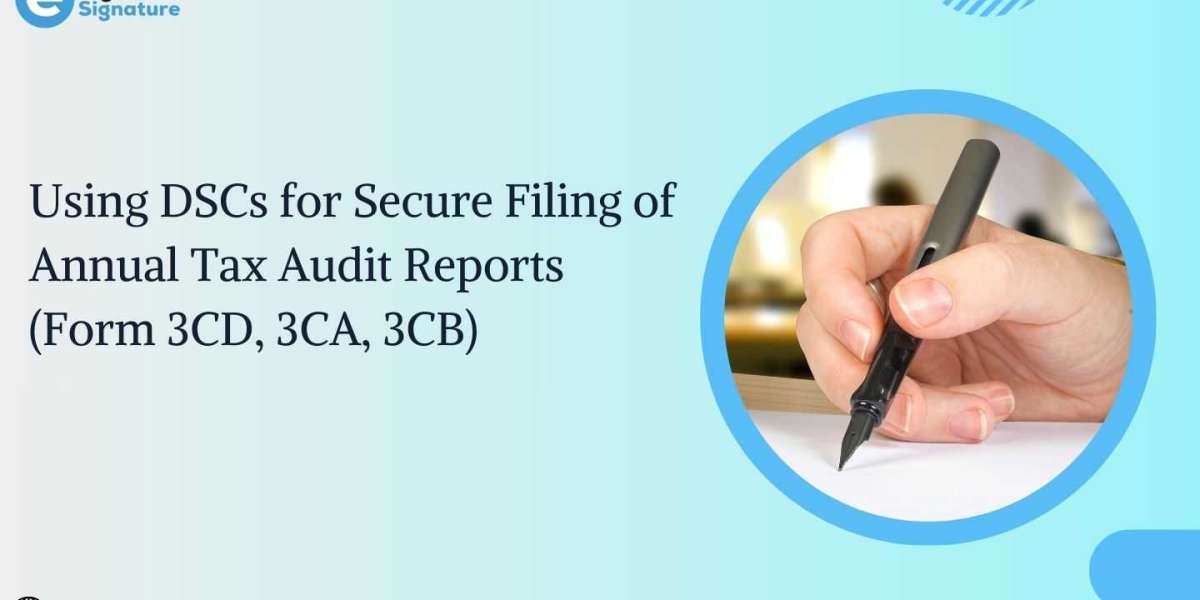In India, businesses and professionals are mandated under Section 44AB of the Income Tax Act to undergo a tax audit if their turnover exceeds specified thresholds. The audit findings are reported using Forms 3CA, 3CB, and 3CD. With the advent of digital platforms, the Income Tax Department has streamlined the filing process, making it more efficient and secure. At the heart of this digital transformation is the Digital Signature Certificate (DSC).
In this blog, we will explain what DSCs are, why they are critical for filing tax audit reports, their benefits for businesses and professionals, and provide a detailed step-by-step guide for securely filing Forms 3CA, 3CB, and 3CD using DSCs.
Understanding the Forms
In India, businesses and professionals whose turnover or income crosses certain thresholds must undergo a tax audit under Section 44AB of the Income Tax Act. The findings of this audit are submitted to the Income Tax Department using Forms 3CA, 3CB, and 3CD. Each form has a specific purpose depending on the type of business and whether accounts are audited under any other law.
- Form 3CA: Used by entities whose accounts are audited under any other law, such as the Companies Act. It confirms that the tax audit has been carried out along with the statutory audit, ensuring compliance for both legal frameworks.
- Form 3CB: Applicable for entities not required to get their accounts audited under any other law. This form focuses solely on the tax audit as mandated by the Income Tax Act.
- Form 3CD: A detailed statement of particulars that accompanies either Form 3CA or 3CB. It includes crucial details about the business’s financials, loans, tax deductions, and other compliance information.
The Role of DSC in Filing Tax Audit Reports
A Digital Signature Certificate (DSC) is an electronic equivalent of a handwritten signature, providing a secure and tamper-proof way to authenticate the identity of the person signing the document. In the context of tax audits:
- Authentication: Ensures that the person filing the report is authorized to do so.
- Integrity: Guarantees that the contents of the report have not been altered after signing.
- Non-repudiation: Prevents the signer from denying the authenticity of the signed document.
- Legal Validity: Recognized under the Information Technology Act, 2000, giving DSCs the same legal standing as traditional signatures.
Step-by-Step Guide to Filing Tax Audit Reports Using DSC
- Obtain a Valid DSC
Ensure that both the taxpayer and the CA possess valid Class 3 DSCs. These can be obtained from licensed Certifying Authorities. - Register DSC on the Income Tax Portal
- Log in to the Income Tax e-Filing Portal.
- Navigate to 'My Profile' and select 'Register DSC'.
- Insert the DSC USB token into your computer and follow the prompts to register.
- Assign Form to CA
- The taxpayer must assign the relevant tax audit form (3CA-3CD or 3CB-3CD) to the CA through the portal.
- Navigate to 'e-File' → 'Income Tax Forms' → 'File Income Tax Forms' and select the appropriate form.
- Enter the CA's details and assign the form.
- Fill and Generate the Form
- The CA accesses the assigned form from their worklist.
- Fill in the necessary details in the offline utility and generate the JSON file.
- Upload and Sign the Form
- The CA uploads the generated JSON file to the portal.
- Use the DSC to digitally sign the form during the submission process.
- Taxpayer Approval
- Once the CA submits the form, it appears in the taxpayer's worklist.
- The taxpayer reviews and approves the form using their DSC.
- Submission Confirmation
- Upon successful submission, an acknowledgment is generated.
- Both the taxpayer and CA receive confirmation of the filed report.
Importance of DSC in Tax Audit Filing
Digital Signature Certificates (DSCs) play a crucial role in ensuring secure and efficient filing of tax audit reports. Here’s why they are so important for businesses and professionals:
- Enhanced Security: DSCs protect sensitive financial and business data from unauthorized access, tampering, or fraud. Since tax audit reports contain confidential information about income, expenses, and deductions, digital signatures provide a tamper-proof authentication that safeguards this critical data.
- Efficiency: Using DSCs reduces the time, effort, and paperwork involved in manual signing and submission processes. Auditors and businesses can submit Forms 3CA, 3CB, and 3CD online quickly, eliminating delays caused by physical signatures, courier services, or multiple visits.
- Compliance: DSCs ensure that filings adhere strictly to the legal requirements set by the Income Tax Department. Digitally signed reports carry the same legal validity as physical signatures, helping businesses avoid penalties and maintain regulatory compliance.
- Global Accessibility: For NRIs and businesses with operations across different locations, DSCs facilitate remote filing and approval. Auditors and authorized signatories can sign and submit forms from anywhere in the world, making the process convenient and seamless for businesses with international operations.
Conclusion
The integration of Digital Signature Certificates in the filing of tax audit reports has significantly streamlined the process, making it more secure and efficient. For businesses and professionals, adopting DSCs is not just a compliance requirement but also a step towards embracing digital transformation in financial reporting.
Note: For expert guidance and to apply for a Digital Signature Certificate, visit https://edigitalsignature.org/.



